Science now supports what may have seemed like common-sense in the past. What you eat, how much you sleep, and how well you manage your stress can make a difference on your ability to fight disease and live healthier longer. Based on recent scientific findings, here are 7 things you can do every day to support greater health and longevity.
Consume 5 Servings of Fruits and Vegetables Daily
Science now supports what may have seemed like common-sense in the past. What you eat, how much you sleep, and how well you manage your stress can make a difference on your ability to fight disease and live healthier longer. Based on recent scientific findings, here are 7 things you can do every day to support greater health and longevity. (Source 1)
Sleep 7-9 Hours Per Night
Make sure you get enough sleep. This varies by individual, but the average recommended amount for adults is 7-9 hours. More and more scientific studies are showing correlations between poor and insufficient sleep and disease. (Source 2)
Incorporate an Active Lifestyle
Make sure to incorporate an active lifestyle, which can include sport activities such as walking, hiking, biking, swimming, jogging, etc., as well as lower impact activities such as yoga, Qi Gong Breathing, Pilates, etc. Recommended amounts for healthy adults aged 18-64 is at least 150 minutes of moderate-intensity aerobic physical activity or at least 75 minutes of vigorous-intensity aerobic physical weekly. Aerobic activity should be performed in bouts of at least 10 minute durations. Muscle-strengthening activities should be done involving major muscle groups on two or more days a week. For additional health benefits, adults should increase their moderate-intensity, aerobic physical activity to 300 minutes or engage in 150 minutes of vigorous-intensity aerobic physical activity weekly. (Source 3)
Practice Meditation and Mindfulness
Meditation and mindfulness training have been shown to reduce stress-induced inflammation. Inflammation is a leading cause of chronic illnesses associated with aging. Mindfulness-based stress reduction consists of continuously focusing attention on the breath, bodily sensations and mental content while seated, walking or practicing yoga. You can start with just 5-10 minutes a day and aim to increase from there. (Source 4)
Reduce Sugar Intake
Sugar consumption has increased by nearly 20% since the 1970’s. (Source 5) This excess consumption of sugar has been linked to obesity and cardiovascular disease. An easy way to reduce sugars from your diet is to look at your beverage consumption, which is where a lot of sugar-based calories hide. Even beverages such as milk and fruit juices can have high amounts of hidden sugars and calories.
Use Extra Virgin Olive Oil
Whether cooking with it or putting it on your salad, extra virgin olive oil is a proven winner when it comes to the well-being of your heart. Among the healthiest of vegetable oils, it’s loaded with heart-healthy monounsaturated fats as well as potent antioxidants that can help reduce inflammation. (Source 6)
Don’t Skip Meals
Although the fasting trend is picking up steam, it is important to take precautions to avoid gallstones. Quick weight loss, skipping meals, and fasting can all contribute to gallstones, especially in women over 40 who are overweight or obese, or people who eat high fat, low fiber diets. (Source 7) That’s why we recommend people who want to practice time-restricted eating to incorporate the Fast Bar™, and for people interested in a prolonged fast to use the ProLon® Fasting Mimicking Diet®. Both the Fast Bar and ProLon support the body in achieving the benefits associated with fasting, while allowing the intake of food for a safer and more enjoyable fasting experience than water only fasting.


